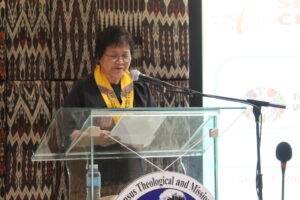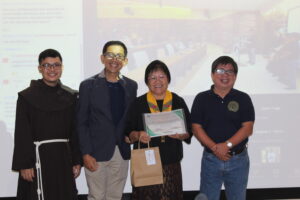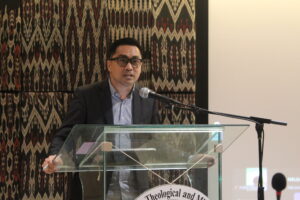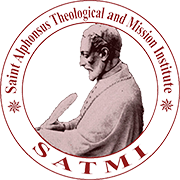𝐓𝐇𝐄𝐎𝐋𝐎𝐆𝐈𝐂𝐀𝐋 𝐅𝐎𝐑𝐔𝐌 𝟐𝟎𝟐𝟒 I 𝐄𝐂𝐎-𝐒𝐏𝐈𝐑𝐈𝐓𝐔𝐀𝐋𝐈𝐓𝐘: 𝐌𝐔𝐒𝐈𝐍𝐆𝐒 𝐎𝐅 𝐀𝐍 𝐀𝐒𝐈𝐀𝐍 𝐇𝐄𝐀𝐑𝐓
𝐁𝐘: 𝐀𝐒𝐒𝐎𝐂. 𝐏𝐑𝐎𝐅. 𝐌𝐒. 𝐂𝐑𝐄𝐒𝐂𝐄𝐍𝐂𝐈𝐀 𝐂. 𝐆𝐀𝐁𝐈𝐉𝐀𝐍, 𝐏𝐇𝐃
𝐑𝐞𝐚𝐜𝐭𝐢𝐨𝐧 𝐏𝐚𝐩𝐞𝐫 𝐨𝐟 𝐁𝐫. 𝐊𝐫𝐢𝐬𝐬 𝐌𝐢𝐜𝐡𝐚𝐞𝐥 𝐀. 𝐓𝐮𝐛𝐨𝐠, 𝐂𝐒𝐬𝐑,
5th Year Theology Student, SATMI
“Eco-spirituality: Musings of an Asian Heart,” delivered by our esteemed speaker, Assoc. Prof. Dr. Crescencia Gabijan on this afternoon’s SATMI Theological Hour, presents a profound exploration of the interconnection between spirituality, environmental stewardship, and the cultural heritage of Asia. The speaker draws upon a rich tapestry of religious teachings, historical documents, and contemporary ecological concerns, inviting us the audience to reflect on our relationship with creation and the responsibility that comes with it.
𝐔𝐧𝐝𝐞𝐫𝐬𝐭𝐚𝐧𝐝𝐢𝐧𝐠 𝐄𝐜𝐨-𝐬𝐩𝐢𝐫𝐢𝐭𝐮𝐚𝐥𝐢𝐭𝐲
At the heart of the speech is the concept of eco-spirituality, which emphasizes the intrinsic connection between spirituality and the natural world. The speaker effectively articulates how various religious traditions, including Christianity, Buddhism, Hinduism, Islam, and others, advocate for the stewardship of the earth. This perspective resonates deeply, particularly in a world increasingly plagued by environmental degradation and climate change. The notion that caring for creation is a spiritual imperative challenges the often-held belief that spirituality is solely an internal or individual pursuit. Instead, the speaker posits that spirituality must extend outward, influencing our actions toward the environment and society.
𝐇𝐢𝐬𝐭𝐨𝐫𝐢𝐜𝐚𝐥 𝐂𝐨𝐧𝐭𝐞𝐱𝐭 𝐚𝐧𝐝 𝐂𝐨𝐧𝐭𝐞𝐦𝐩𝐨𝐫𝐚𝐫𝐲 𝐑𝐞𝐥𝐞𝐯𝐚𝐧𝐜𝐞
The references to the 1988 CBCP Pastoral Letter and Pope Francis’s encyclicals, such as Laudato Si’ and Laudate Deum, provide a historical framework that underscores the Catholic Church’s long-standing commitment to environmental issues. The invocation of these documents reminds us that the call for ecological responsibility is not a new phenomenon; rather, it is deeply rooted in religious teachings. The speaker’s emphasis on the need for “ecological conversion” aligns with Pope Francis’s assertion that a genuine faith must transform our relationship with creation. This call to action is particularly relevant in today’s context, where the effects of climate change disproportionately affect the most vulnerable populations.
𝐂𝐮𝐥𝐭𝐮𝐫𝐚𝐥 𝐇𝐞𝐫𝐢𝐭𝐚𝐠𝐞 𝐚𝐧𝐝 𝐋𝐨𝐜𝐚𝐥 𝐏𝐫𝐚𝐜𝐭𝐢𝐜𝐞𝐬
One of the most compelling aspects of the speech is the emphasis on the importance of cultural heritage and traditional practices in addressing climate change. The speaker highlights initiatives like the Southeast Asian Culture Heritage Alliance (SEACHA), which seeks to integrate local wisdom into modern climate action policies. This approach recognizes that indigenous and local communities possess valuable knowledge and practices that can contribute to sustainable environmental stewardship. It is a hopeful reminder that solutions to our global challenges may lie within the cultural frameworks and traditions that have long been established.
𝐓𝐡𝐞 𝐂𝐡𝐚𝐥𝐥𝐞𝐧𝐠𝐞 𝐨𝐟 𝐂𝐨𝐥𝐥𝐞𝐜𝐭𝐢𝐯𝐞 𝐀𝐜𝐭𝐢𝐨𝐧
Our speaker poses a critical question: “If many religions profess nature conservation and protection, why is the world as it is today?” This inquiry serves as a poignant reminder of the gap between belief and action. While religious teachings advocate for the protection of the environment, the reality is that many individuals and communities continue to engage in practices that harm the earth. This disconnect challenges us to examine our own lives and consider how we can embody the principles of eco-spirituality in our daily actions. It calls for a collective effort to bridge this gap, fostering a culture of environmental responsibility that transcends religious and cultural boundaries.
𝐀 𝐕𝐢𝐬𝐢𝐨𝐧 𝐟𝐨𝐫 𝐭𝐡𝐞 𝐅𝐮𝐭𝐮𝐫𝐞
The speech concludes with a glimmer of hope, emphasizing the potential for positive change through individual and communal efforts. The metaphor of “a pebble thrown into a pond” illustrates how small actions can create ripples of transformation. This perspective is empowering, reminding us that each of us has a role to play in the stewardship of creation. The call to “walk the talk” and engage in concrete advocacy resonates deeply, encouraging us to take tangible steps toward environmental sustainability.
In summary, “Eco-spirituality: Musings of an Asian Heart” is a thought-provoking address that challenges us to reconsider our relationship with nature through the lens of spirituality and cultural heritage. The integration of religious teachings, historical context, and contemporary initiatives offers a comprehensive understanding of the ecological crisis we face today. As we reflect on the insights shared in this speech, we are reminded of our shared responsibility to care for creation and to inspire others to join us in this vital endeavor. Ultimately, the journey toward ecological conversion begins with each of us, as we strive to embody the principles of eco-spirituality in our lives and communities.



For more photos:
Photo credits: Br. Richard R. Rosete, OFM
